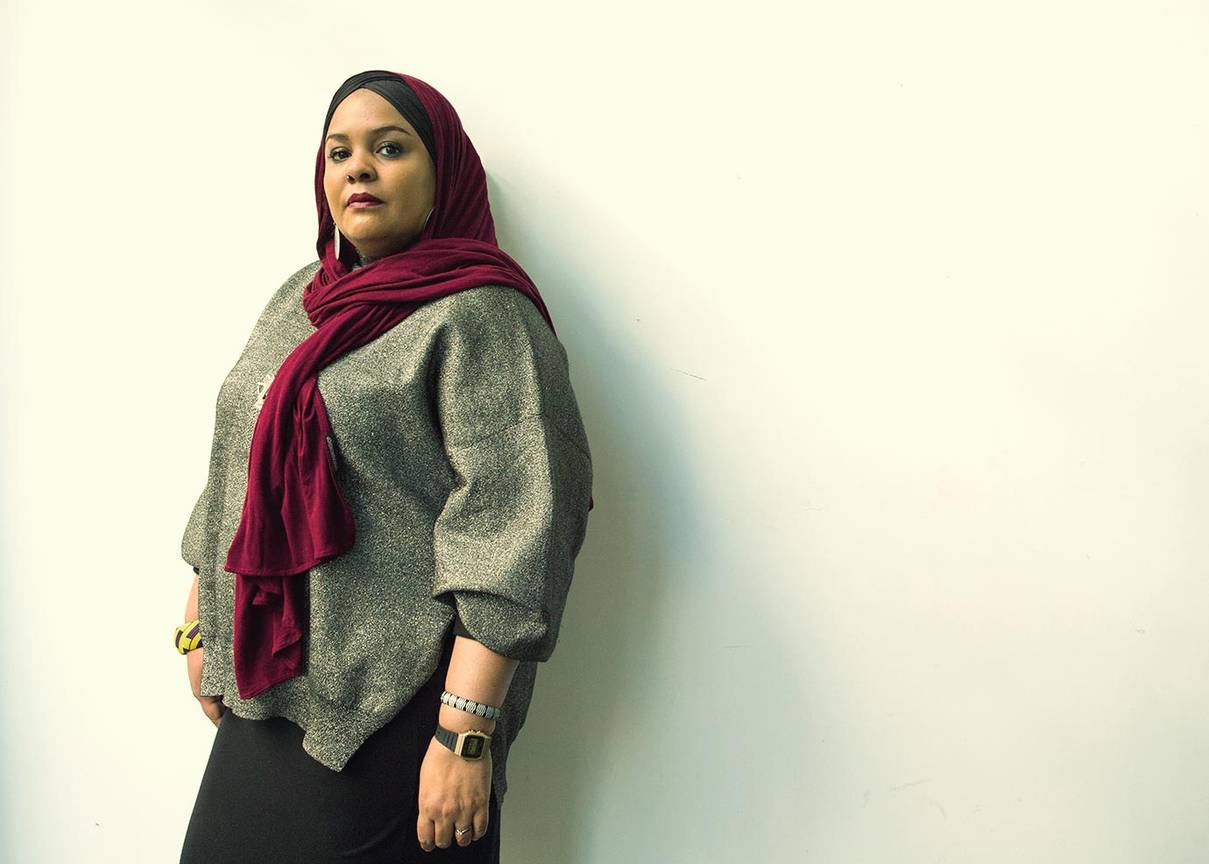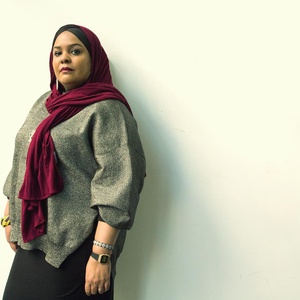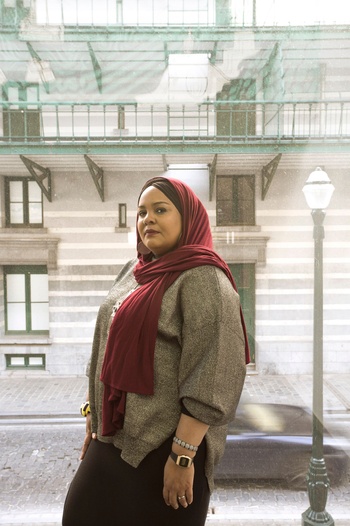On the commemoration of the 22 March attacks, British poet and performer Sukina Douglas is going on a poetic pilgrimage through a city that was wounded to its core. “As dark as it may be, when I find the poetry, I find myself.”

© Heleen Rodiers
| Sukina Douglas
Sukina Douglas: The poetic pilgrimage of a hip-hop hijabi
We live in a time where there’s a lot of hate, a lot of darkness. I feel like it’s impossible for me to exist in this time and not seek beauty, not seek poetry. I don’t see how I would survive.” Sukina Douglas places immense trust in poetry. The Bristol-born Londoner is a poet, a performer (as in the KVS’s Malcolm X), half of the spoken-word and hip-hop duo Poetic Pilgrimage, and a warm, inspiring bridge builder. It is in the latter capacity that she came to explore our city in February and March, met the people who inhabit its nerve bundles and arteries, and, in a number of intense poetry workshops entitled Rise Up, helped to heal the scars that the 2016 attacks gashed into the urban soul. By sharing. With one another and with the public, which can see the results of those workshops in an intimate Poetic Memorial on 21 March. A day later, the poems will be installed around the city as commemorations.
At first sight, it may seem like Sukina Douglas is only throwing a little pebble into Brussels’s troubled waters, but the ripple effect on the few people that she touches can be immense. “Sometimes we’re disconnected with how we feel. How do you listen to your heart and let it speak? How do you activate that voice? So the first stage of the workshop is going inside, getting into your own skin. It’s about asking yourself really strong questions, like: ‘What am I afraid of?’ ‘What gives me hope?’ ‘What do I fight for?’ That in itself is already a big process. It’s important that people feel they are enough. Their story, their perspective, if that’s how they feel, it’s enough. Then I get them to write about the city from their own perspective, and after that we look at somebody else’s reality, which is completely different from their own, like a sex worker, a refugee, or a homeless person.”
For me, not doing art would be like losing a limb. Like saying: 'Maybe I won't be a black person'

“Once you go into the soul of the city and look outside yourself and how the attacks affected not just you but the city as a living entity, your perspective changes. When you hear that the women from Molenbeek were in just as much pain for their city, you realize that we’re all grieving. We all want to be part of a dialogue, whether you’re an undocumented minor, a sans-papiers, an expat, a lawyer, or a writer.”

© Heleen Rodiers
flow
“My experience with art and poetry is just overflow. It’s like you’re full and you need to get it out,” Sukina Douglas says. About 15 years ago, this overflowing head and heart led her and Muneera Rashida to found Poetic Pilgrimage, a hip-hop collective that is so extraordinary that Al Jazeera made a documentary about it, Hip-Hop Hijabis. “We just felt really underrepresented,” Sukina Douglas explains. “In music, in art, in culture. We were young British girls from a Caribbean background, studying at the same university, and we didn’t feel like we saw ourselves anywhere. There was no space for us. We were learning so much, absorbing so much information, and we had so much to say. The hip-hop community was defining itself. It was like: we’re not waiting for someone to tell us anything, we’re going to tell our own stories. There were times when I experienced hardship when I first started rapping and had to fight a big room of guys to get to the microphone and be present. There was something very empowering about it, something very spiritual.”
To complicate things even more, that spiritual side also crystalized in her conversion to Islam. “At the time I wasn’t interested in Islam at all. I was very much a free spirit, with long dreadlocks. [Laughs] I would go to Ethiopian Orthodox or Buddhist celebrations, I was really into the spirituality of yoga. I had kind of a patchwork relationship with God. Islam was never on the agenda for me, ever. Interestingly, I read the autobiography of Malcolm X for my studies. And even though I had read it before, maybe because I was studying it in an academic context, it was speaking to me in a different way. I’m so familiar with history, my whole childhood I’ve been raised knowing who he was. But this time it felt really different.”
A book by the secular Moroccan feminist Fatima Mernissi about the relationship between women and Islam was a stepping stone. “She separated culture from religion, put it into context, talked about how what she witnessed in her culture was different from what she found in the texts. And even though I was really powerful in my perspective, I couldn’t deny what I felt when I read it. It would have been weak of me to say I didn’t feel something.”
Be present
Sukina Douglas answered that call, even if it meant dealing with hostility, or being attributed with an unwanted pivotal role. “In the muslim community people would walk out of the room or shout things at us. When Al Jazeera made a documentary about us, we got death threats. That actually only strengthened our belief in what we were doing. Creating dialogue is essential. As Poetic Pilgrimage we perform in places where people have never spoken to Muslim women before in their whole lives. It’s almost like they ask us every single question they have about Islam. I don’t necessarily feel that I should be the spokesperson for my religion, but I don’t want to run away from the conversation.”
Instead she chose to build bridges. “A faith is a faith, and I’m a devout Muslim, but there are different ways you live your Islam,” she says. “Some people believe you shouldn’t be around non-Muslims, whereas my teachers always said: ‘Be present. Don’t remove yourself from society.’ Some people believe you shouldn’t engage in art, whereas I heard: ‘Engage in creativity.’ Not doing art never even crossed my mind. For me that would be like someone saying: ‘Maybe I won’t be a black person.’ It’s so innate to my being that it would almost be like me losing a limb if I didn’t do what I do.”
“You know, I descend from people who were stolen from Africa and taken to the Caribbean as slaves. The ocean is a cemetery for millions of my ancestors. Maybe the only way we survived was through our expression. The power of the word, the power to sing, to make noise and music. I don’t really see any different: this, for me, is a coping mechanism. As dark as it may be, when I find the poetry, I find myself.”
> Rise Up: Poetic Memorial @ Life4Brussels. 22/3, 19.30, Salle Lumen.
Read more about: Expo
Fijn dat je wil reageren. Wie reageert, gaat akkoord met onze huisregels. Hoe reageren via Disqus? Een woordje uitleg.